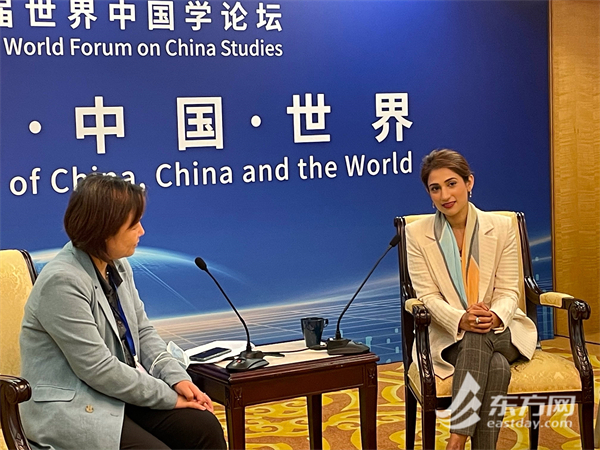Six years ago, with an aim of finding a better solution for global governance, Zoon Ahmed Khan, a Pakistani researcher and journalist, came to China. What she has seen and witnessed here has deepened her understanding of the ties between China and Pakistan and in particular, the Belt and Road Initiative (BRI).
Zoon is now working as a research fellow of the Belt & Road Strategy Institute at Tsinghua University. She was duly invited to make a speech at the Ninth World Forum on China Studies.

(Zoon Ahmed Khan [middle] at the Ninth World Forum on China Studies)
“For me, the Belt and Road is a vision. It is a vision that is away from competitive and negative competition and fosters more connectivity and more mutual cooperation,” said Zoon.
In her eyes, the BRI is different from the Marshall Plan. “It is not fixed, because even if you look at China’s domestic development and achievements, it has been about constant correction, constant improvement, and constant observation. And under the BRI as well, countries have bilateral mechanisms to begin with that are constantly reflecting on the success of the project, and how to progress it. So this is kind of a development,” she added. “It is away from zero-sum thinking when you think of the BRI.”
Zoon has conducted fieldwork on the China Pakistan Economic Corridor, the flagship project of the BRI. In her opinion, at the heart of the success of the BRI is how much it can impact people. As she said, many people in Pakistan have benefited from the investments under the BRI framework.
On August 10, Chinese President Xi Jinping responded to foreign representatives of the Global Young Leaders Dialogue (GYLD), commending their efforts to visit various provinces of China and deepen their understanding of the country. Zoon is one of the representatives.
As a young journalist, Zoon also stressed the important role of youth in promoting the mutual understanding between different countries through shared experiences. For example, she mentioned the GYLD. “After that experience, we learnt and we saw what success China’s experience looks like, let’s say, 800 million people out of poverty.” In her opinion, shared experiences help people create another layer of identity.
“Young people also need to think about multilateral ways to get friendship,” said Zoon. “Through the Belt and Road, we have mechanisms for students and young professional exchanges. This is the approach: investing in shared experiences, and there are multiple others. Another is showing the humane, and the candid, without any editing, that is so impactful,” added the young scholar.
As such, her suggestion for journalists is that showing candid images of normal people is going to really build bridges. “It is going to make people relatable to each other.”
While mentioning China, Zoon uses “dynamic” to describe Chinese youth. At Tsinghua University, she has seen that young people are very quick, alert and receptive. And Chinese young people are very concerned about the world in a positive way. “From people from different parts of China, I see an increasing desire to build the world together with other countries,” noted Zoon.
